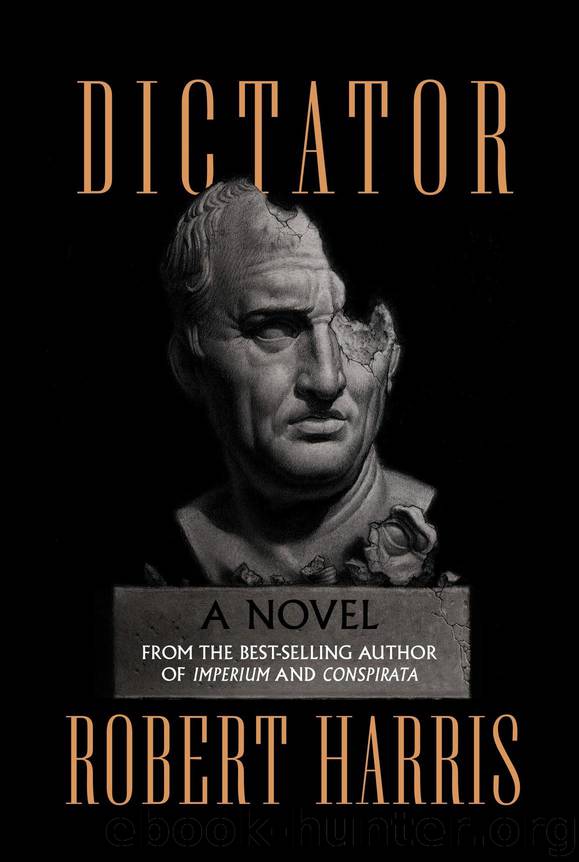The Dictator by Robert Harris

Author:Robert Harris
Language: eng
Format: mobi, epub
Tags: Historical Fiction
Publisher: Knopf Doubleday Publishing Group
Published: 2016-01-11T11:00:00+00:00
The battle, which at that time had no name but afterwards came to be called Pharsalus, should never have been lost, according to Labienus, and he spoke bitterly of Pompey’s generalship, calling it vastly inferior to Caesar’s. (Mind you, others, whose tales we heard later, blamed the defeat partly on Labienus himself.) Pompey occupied the best ground, he had the most troops—his cavalry outnumbered Caesar’s by seven to one—and he could choose the timing of the battle. Even so, he had hesitated to engage the enemy. Only after some of the other commanders, notably Ahenobarbus, had openly accused him of cowardice had he drawn up his forces to fight. Labienus said, “That was when I saw his heart wasn’t in it. Despite what he said to us, he never felt confident of beating Caesar.” And so the two armies had faced one another across a wide plain; and the enemy, at last offered his chance, had attacked.
Caesar had obviously recognised from the start that his cavalry was his greatest weakness and therefore had cunningly stationed some two thousand of his best infantry out of sight behind them. So when Labienus’s horsemen had broken the charge of their opponents and gone after them in an attempt to turn Caesar’s flank, they suddenly found themselves confronted by a line of advancing legionaries. The cavalrymen’s attack broke upon the shields and javelins of these fierce unyielding veterans and they galloped from the field, despite Labienus’s attempts to rally them. (All the time he was speaking I was thinking of Marcus: a reckless youth, he, I was sure, would not have been one of those who fled.) With their enemy’s cavalry gone, Caesar’s men had fallen upon Pompey’s unprotected archers and wiped them out. After that, it was a slaughter as Pompey’s panicking infantry had proved no match for Caesar’s disciplined, hardened troops.
Cato said, “How many men did we lose?”
“I cannot say—thousands.”
“And where was Pompey amid all this?”
“When he saw what was happening, he was like a man paralysed. He could barely speak, let alone issue coherent orders. He left the field with his bodyguard and returned to camp. I never saw him after that.” Labienus covered his face with his hands; we waited; when he had recovered, he went on: “I’m told he lay down in his tent until Caesar’s men broke through the defences and then he got away with a handful of others; he was last seen riding north towards Larissa.”
Download
This site does not store any files on its server. We only index and link to content provided by other sites. Please contact the content providers to delete copyright contents if any and email us, we'll remove relevant links or contents immediately.
In Control (The City Series) by Crystal Serowka(36228)
The Wolf Sea (The Oathsworn Series, Book 2) by Low Robert(35249)
We Ride Upon Sticks by Quan Barry(34539)
Crowbone (The Oathsworn Series, Book 5) by Low Robert(33623)
The Book of Dreams (Saxon Series) by Severin Tim(33386)
The Daughters of Foxcote Manor by Eve Chase(23628)
Trainspotting by Irvine Welsh(21667)
Call Me by Your Name by André Aciman(20517)
The Secret History by Donna Tartt(19090)
Shot Through The Heart (Supernature Book 1) by Edwin James(18926)
All the Missing Girls by Megan Miranda(16029)
American King (New Camelot #3) by Sierra Simone(15893)
The Girl from the Opera House by Nancy Carson(15785)
Pimp by Iceberg Slim(14508)
Sad Girls by Lang Leav(14423)
The Betrayed by Graham Heather(12832)
The Betrayed by David Hosp(12792)
4 3 2 1: A Novel by Paul Auster(12393)
Still Me by Jojo Moyes(11266)
